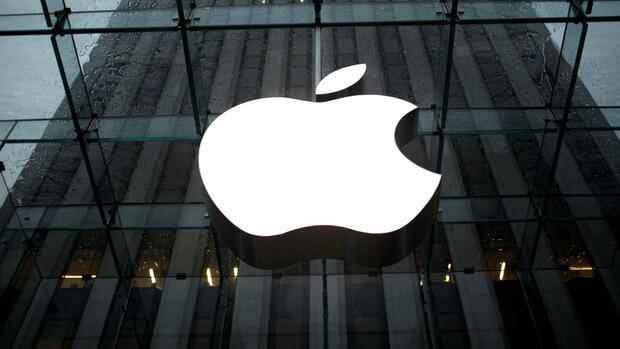The technology group is by far the largest share buyback in the United States.
(Photo: Reuters)
Dusseldorf The iPhone manufacturer Apple has spent around 50 billion dollars every year since 2011 to acquire its own shares. That is more than twice as much as all German companies are currently investing together in such programs, some of which run for several years.
In the US, companies announced share buybacks for a record $1 trillion last year. This makes them the largest group of buyers on Wall Street. Apple and Alphabet alone have promised their shareholders renewed buybacks totaling $140 billion, while Microsoft recently made $60 billion.
For comparison: In Europe, companies bought back their own shares for around 70 billion euros in 2021. The big buybacks include the food giant Nestlé and the German-American industrial gases specialist Linde.
Because the companies are mostly financing the buybacks with bonds, the debt has risen to record levels. Ten years ago, the 500 US companies in the S&P 500 stock index had a debt of seven trillion dollars; it is currently eleven trillion dollars.
Top jobs of the day
Find the best jobs now and
be notified by email.
Critics speak of balance sheet cosmetics: US corporations achieved a quarter of all profit increases in the last ten years through higher earnings per share because the number of shares has decreased through buybacks. Absolute profit, on the other hand, stagnated or fell.
Unlike in Germany, US corporations finance their costly programs primarily with loans and bonds, and thus borrowed capital. And that’s just to boost the stock price in the short term and make managers’ stock options more valuable.
This procedure, called “financial engineering”, “harms companies and the entire economy,” explains Marcus Hüttinger, market strategist at the independent asset manager Gané. In his view, share buybacks should only be an option if the necessary growth investments have been made in addition to the maintenance investments.
Credit is cheaper for Apple than cash repatriation
Last spring, Google Holding Alphabet announced buybacks for $50 billion and has issued bonds for almost $10 billion since 2020. In return, the group pays its creditors interest of between half a percent and a good two percent.
By far the largest buyback is Apple – $488 billion over the past decade and a new $90 billion program since April 2021. In parallel, the company has issued bonds for $55 billion since early 2020.
Apple is actually in a comfortable position with a current cash position of $191 billion. The problem: the majority is abroad. The company would have to pay tax on repatriation to the USA. With interest rates low, it’s therefore cheaper for the company to borrow to finance its share buybacks than to pay taxes on its profits.
The practice of Apple and Co. is controversial in the USA. At the end of last year, President Joe Biden presented the cornerstones of his agenda for improving social and climate policy. In the next ten years, 1.75 trillion dollars are to be spent on investments, almost a third of which will be used to combat climate change.
Biden is relying on tax increases to finance it. A tax on share buybacks of one percent on the volume bought back is also planned. Calculated back to the buybacks in the past decade, that would be additional government revenue of around five billion dollars a year.
More: Share buybacks on a record course: Dax companies spend almost 17 billion euros
